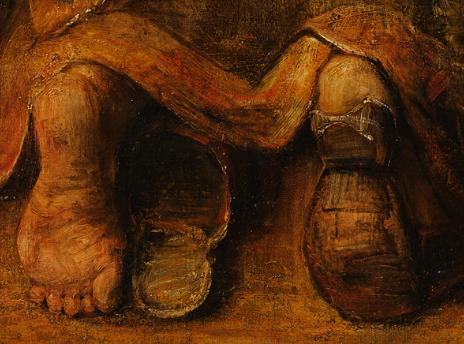
While ancient near east history lessons may add layers to the text, the basic story of the Prodigal Son– a father’s love for his two wayward sons- is easily accessible across millennia. The heartwarming first half of the parable, with the angry runaway’s return to his unexpectedly gentle father, transcends time. Who has ever lived and not longed for a paternal love like that?
 And yet, the beloved first half of the parable is a setup for the second half’s word of judgment. The father’s grace divides the family, and as the party for the returned runaway kicks into high gear, the dutiful and jealous older son refuses to take part. The father’s gentle rebuke to his second prodigal son: “It is fitting to celebrate and be glad, for this your brother was dead, and is alive; he was lost, and is found.” Both of these sons are in need of their father’s grace.
And yet, the beloved first half of the parable is a setup for the second half’s word of judgment. The father’s grace divides the family, and as the party for the returned runaway kicks into high gear, the dutiful and jealous older son refuses to take part. The father’s gentle rebuke to his second prodigal son: “It is fitting to celebrate and be glad, for this your brother was dead, and is alive; he was lost, and is found.” Both of these sons are in need of their father’s grace.
Keep this prodigal dynamic in mind if you’re listening to season 2 of Serial over the coming months. The story of America’s prodigal soldier Bowe Bergdahl and his half-decade imprisonment is five episodes in, and it takes a significantly different track than season 1’s who-done-it story about Baltimore teen Adnan Syed. If season 1 of Serial asked us to consider “is Adnan really guilty,” season 2 asks us an (arguably) more profound question: “POW Bergdahl was guilty of desertion- so how should we respond?”
It’s a stark contrast between these two seasons of Serial. Unlike the lack of certainty behind Adnan’s guilt, Bow Bergdahl openly admits to leaving his post in Afghanistan in June of 2009. The soldier literally walked away from his assigned duties, stepping over his unit’s barbed wire perimeter fence, and venturing out into the Afghan wilderness in protest of his unit’s poor leadership. He was quickly captured and held in Taliban captivity for five years. Berghdal was returned via prisoner exchange to the U.S. in May of 2014.
 Serial holds no punches in describing Bergdahl’s imprisonment. Locked in dark rooms, tied, spread-Eagle, to a bed for months, locked in a cage, three years straight of diarrhea, and that’s not counting the beatings and sickness– the guy went through worse than most of us could imagine. The suggestion has been made that life has punished Bergdahl enough for his desertion. I’m not sure he will experience anything worse than what he’s already experienced.
Serial holds no punches in describing Bergdahl’s imprisonment. Locked in dark rooms, tied, spread-Eagle, to a bed for months, locked in a cage, three years straight of diarrhea, and that’s not counting the beatings and sickness– the guy went through worse than most of us could imagine. The suggestion has been made that life has punished Bergdahl enough for his desertion. I’m not sure he will experience anything worse than what he’s already experienced.
And yet, as soldiers across Afghanistan share about their own season of hell searching for him, the question of mercy becomes harder. He is certainly the most hated individual in the U.S. Army right now. Even his own unit confesses to fantasies of murder if they were to ever see him again. As episode 5 outlines, that resentment even extended to diplomats working on the mission to secure Bergdahl’s release. It is testified that those involved in the mission operated with a “why should I care” attitude in bringing him home. As narrator Sarah Koenig articulates:
And then… the announcement that the army will pursue the charges in the most serious way possible: a general court-martial. It’s almost as if those military officials who’ve come into close contact with Bowe are ready to forgive him, while the army as an institution continues to be furious.
Even now, returned to the states, Bergdahl is working on administrative duty with an armed guard because there’s a fear for his safety from fellow soldiers. Clearly, he is no longer a part of the band of brothers.
Expect the moral seriousness of Serial to deepen as new episodes are released, and expect the rhetoric about what to do with Sgt. Bergdal to heat up too. For now, let’s put aside the legal questions. Church and state matters aren’t really my strength- plenty of other books and blogs can help you decide if God gave humans Two Kingdoms or a Transformationalist mandate.
But if we’re going to ask cosmic moral questions, especially about complex issues surrounding rescue, forgiveness, and the penalties for sin, Jesus has already made up his mind. As the rest of Luke 15 outlines, this a Jesus who gets pumped about lost sheep and lost coins along with lost sons. Surely a lost soldier is within that gracious purview. It’s so tempting to declare oneself righteous by peer-review, to sour the party by refusing to celebrate the returned prodigal. And there’s another parable about refusing party invites too. But for now, as long as Jesus’s parable has two lost sons instead of just one, it may be better to just join the party. Who knows? One day, we might be attending a prodigal feast of our own making.

COMMENTS
Leave a Reply












